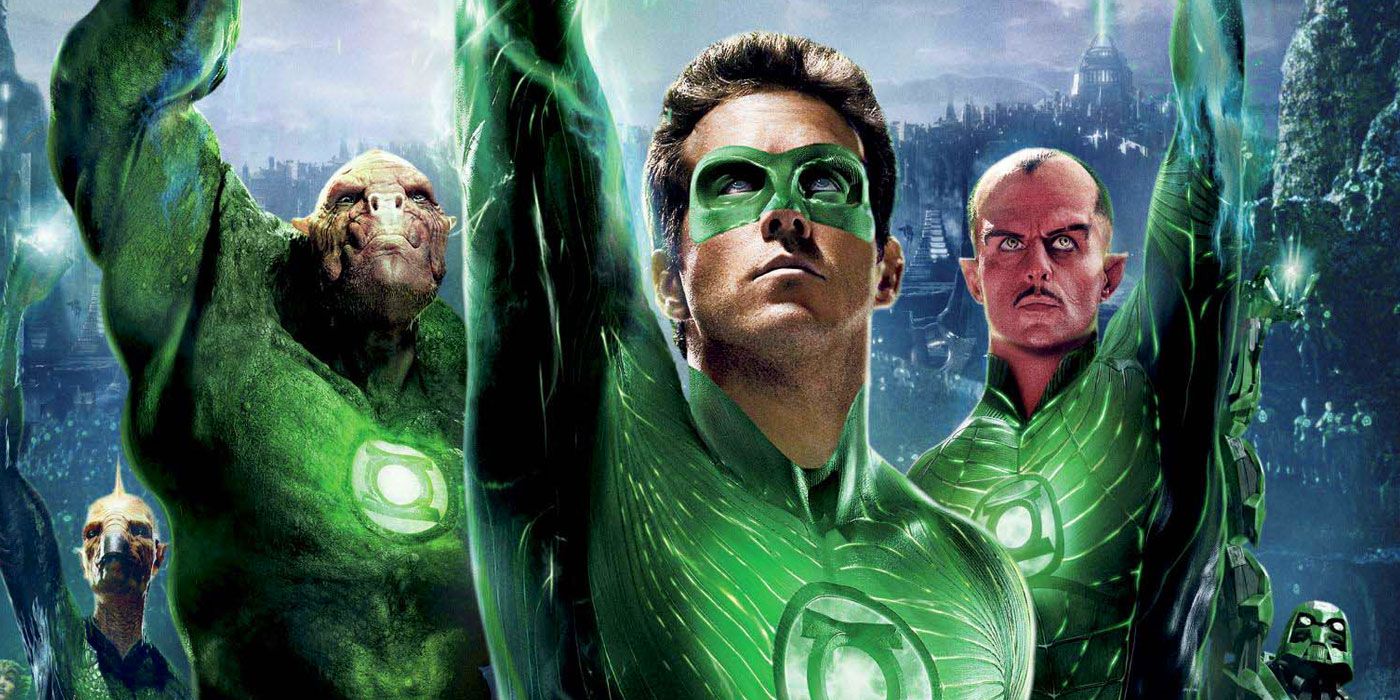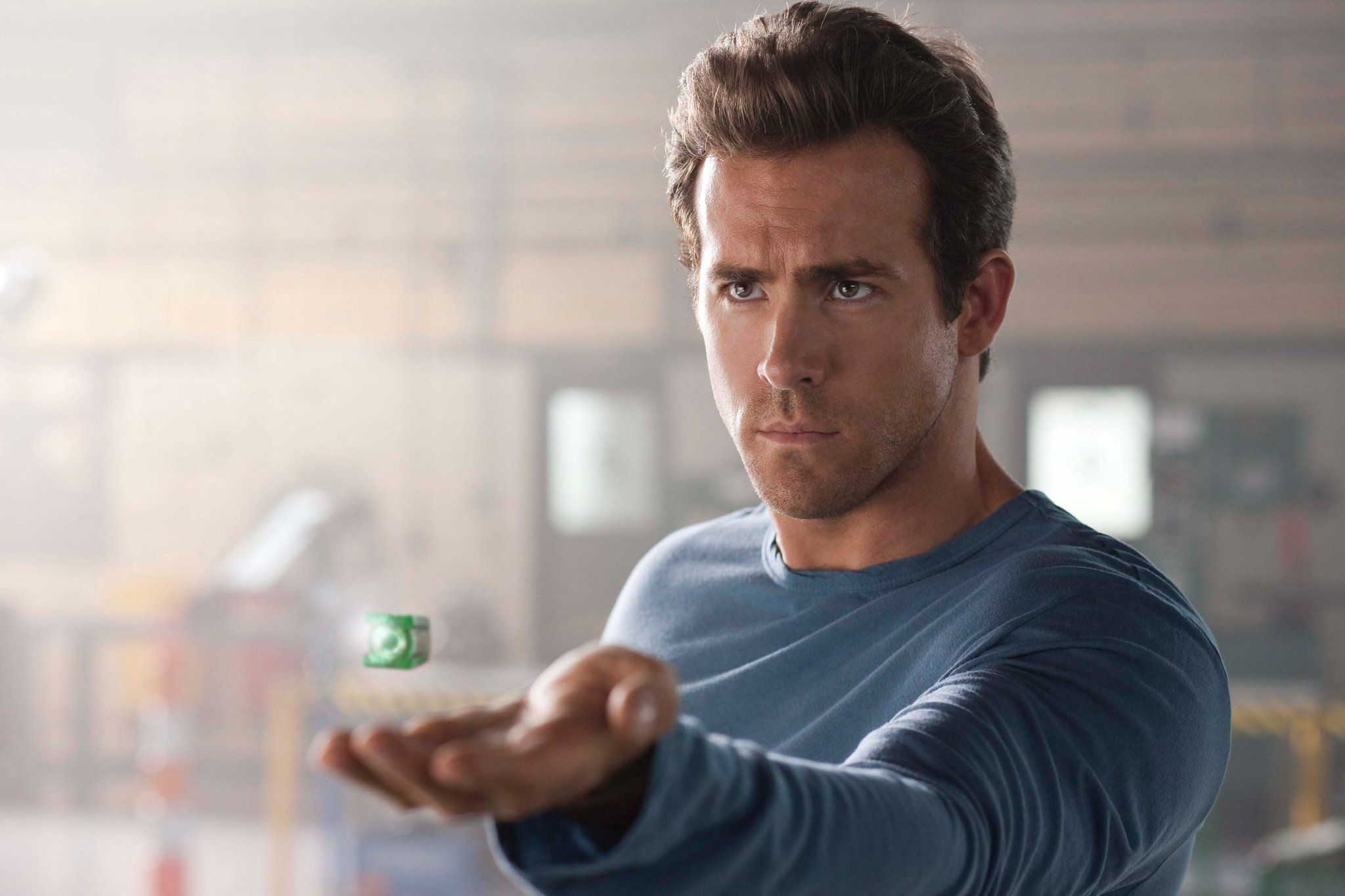Though it has been on Warner Bros.' slate of DC Extended Universe movies since 2014, the past few weeks have brought signs that things might finally be moving forward for "Green Lantern Corps." First came reports that David S. Goyer and Justin Rhodes had been hired to write the script. Then came a leaked short list (or wish list) of possible actors to play an aging Hal Jordan, including Tom Cruise, Bradley Cooper, Jake Gyllenhaal and none other than Ryan Reynolds, who played Hal in the critically-maligned 2011 "Green Lantern" film.
Reading the news, I suddenly remembered something: I had never actually gotten around to watching the 2011 "Green Lantern." The movie came out when I was in grad school (i.e., poor) and got almost universally negative reviews, so I did not make a concerted effort to watch it. Now, six years later, I thought it time to remedy that gap in my comics-related viewing. (And, it being 2017, of course I had to live tweet the experience.)
RELATED: Ryan Reynolds Wrote Deadpool While Filming Green Lantern
Going in, I had three major questions in mind: first, was "Green Lantern" really as bad as its reputation; second, should Ryan Reynolds get a second chance to put on the ring; and, third, what could "Green Lantern Corps" learn from the 2011 movie?
On the first question, the answer is most decidedly yes: "Green Lantern" is absolutely as bad as its reputation. The problems start in the very first sequence, an exposition-heavy prologue set galaxies away in the distant past that gets into way more than any regular viewer would ever need to know about the Guardians, the Green Lantern Corps and Parallax. We're nearly ten minutes into the film before we finally meet Hal. Unfortunately, the exposition-heavy dialogue continues, most often in extended scenes where he's not present.
As I watched the movie, I thought about how much better the movie would have been with a simpler story structure focused on Hal as the viewpoint character. It could have started with him, and only revealed the backstory of the Green Lantern Corps as Hal himself learns about it. Hal's first trip to Oa could have been truly spectacular if we hadn't already seen it half an hour earlier. Plus, it would have put Hal firmly at the center of the story.
Instead, we got an overly complicated plot that also committed the cardinal sin of superhero movies: too many villains. We didn't just get Parallax (a truly puzzling decision for Green Lantern's big screen debut); we also got Hector Hammond (played reasonably well by Peter Saarsgard), as well as a heroic Sinestro (played by Mark Strong under a thick veneer of CGI). The one surprising twist in the movie was that Sinestro did not turn evil before the end, even after making himself a Chekhov's Yellow Lantern ring to fight Parallax.
The movie's other great sin, hinted at already, was its extreme reliance on CGI at the expense of practical effects. It had the effect of making everything -- the villains, Oa, the other Green Lanterns, and to some extend even Ryan Reynolds -- feel unreal. In a few instances, the CGI steps well over the line into the uncanny valley, adding a sense of creepy uneasiness at inappropriate moments. "Green Lantern" was probably a film that would have been impossible to make without CGI, but over-reliance on it helped kill the audience's ability to connect to what was going on.
After my two hour viewing experience, there was only one thing that kept me from actively shuddering at the thought of watching more Green Lantern: Ryan Reynolds. Now, I'm not saying Reynolds was great in "Green Lantern," but he did his best with some truly terrible material. In the few instances where Reynolds was given a chance to be funny, he nailed it. ("Green Lantern" also seriously underused Blake Lively, and I weep for the Spencer Tracy/Katherine Hepburn style banter we could have gotten between Hal and Carol.)
While Reynolds did not epitomize Hal in the way that he inhabited Deadpool, I genuinely liked him in the role and think he deserves another shot—if he wants it, that is.
Truth be told, there are many reasons why Reynolds might not have any interest in revisiting "Green Lantern." With "Deadpool," he showed that he can headline a superhero movie starring a character not well-known by the general public. He doesn't have to prove anything by showing up for "Green Lantern Corps," especially if he would be but one of several Earth-based members. The grimdark tone of the DC Extended Universe movies also does not mesh particularly well with Reynolds' demonstrated strengths with humor and irreverence.
That said, if Reynolds wants to come back, Warner Bros. could certainly do much, much worse. While I can see the brilliance a mid-1980s Tom Cruise -- fresh off of "Top Gun" -- as Hal Jordan, 2017 Cruise comes with a lot of baggage, especially for a movie about aliens and will overpowering fear. Cruise-as-Hal would means months of comparisons of "Green Lantern Corps" to Scientology, which could only hurt the movie.
Whomever Warner Bros. ultimately casts in the role of Hal, however, might not be nearly as important as who they cast as the other Green Lanterns, especially John Stewart. Thanks to the "Justice League" cartoons, an entire generation of fans knows John Stewart better than Hal Jordan, so it makes sense for Warner Bros. to push him to the forefront, even if Hal is still around in a supporting role.
I do hope, though, that Warner Bros. learns from some of the mistakes made in "Green Lantern." First off, simpler is better: there is no need for a convoluted plot when a simple one would work. Stick to one villain and keep the focus on the central team as much as possible. In fact, Warner Bros. might want to borrow a page from Marvel's "Guardians of the Galaxy" in making the dynamic of the Green Lantern Corps work.
Second, let the characters and actors do what they do best. Reynolds was too often boxed in by an overly dramatic script that did not give him enough chances to be funny. "Green Lantern Corps" doesn't have to be "Deadpool," but it also doesn't have to be "Batman v. Superman."
Third, cut back on the CGI, starting with the CGI suits. Put the Lanterns in some actual clothes. Use practical effects and makeup. "Green Lantern" went over the top with CGI, becoming a distraction rather than something that made the film feel more real.
If Warner Bros. can learn from the "Green Lantern" debacle, I genuinely believe there is a great "Green Lantern Corps" movie out there to be made. And a great "Green Lantern Corps" movie could be both critically and commercially successful. "Green Lantern" didn't fail because the audience didn't know who Hal was or was too jaded for its sometimes goofy tone; it failed because it was a poorly made movie that was a slog to sit through.
I'll be crossing my fingers until 2020.


